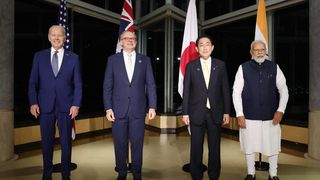Next week’s long-awaited Quad summit was canceled after President Biden’s administration announced that he would be cutting short his trip to the Indo-Pacific. The Quadrilateral Security Dialogue, or more popularly, the Quad, is a partnership of India, Australia, Japan, and the United States focused upon delivering public goods and security in the region. The upcoming summit, the third such in-person meeting since the Quad’s inception, was expected to focus on the partners’ work on key issues ranging from maritime domain awareness to climate change and emerging technologies.
Biden will also miss what would have been a much-lauded, first visit by a US president to Papua New Guinea, which was to feature the inking of several key security agreements with regional partners. As the president returns to Washington to take part in negotiations with Republican House leadership, domestic issues are dragging down successful US policy in the Indo-Pacific. Watching this display of the United States’ dysfunction at home sends a message to prospective partners, and it’s not a good one.
The cancellation of the Quad summit is particularly damaging given the sensitivities that surround the grouping and still exist within it. After years of struggling to convene the group, balancing Indian fears of abandonment and Australian political sensitivities, the group has finally begun to make headway in some respects. But without the United States it does not exist, and US reliability is very much on the minds of the other three partners.
And there is no way to spin this cancellation that fixes the overwhelming impression of a Washington that is unstable and consumed by division. It is a blow in particular to Australian Prime Minister Anthony Albanese, who is engaged in the earliest stages of a generational shift in Australian defense strategy and working to sell his constituents on an upgraded United States-Australia alliance and significant investments in the US defence industrial base.
In Port Moresby, the government of Papua New Guinea has been planning for a three-hour visit for six months, even going so far as to designate the day as a public holiday to give citizens an opportunity to see President Biden. The signing of bilateral agreements on defense cooperation and maritime surveillance set to be completed during the visit, along with renewed 20-year Compact of Free Association agreements with Micronesia and Palau, will likely be delayed.
As the Biden administration attempts to rebuild US relationships in the South Pacific, it is already well behind Beijing, which has developed valuable influence networks and established security agreements with states such as the Solomon Islands. While most of these states might prefer relationships with the United States, they will certainly prioritize the partner that shows up on time and bringing investment. While not a fatal blow, letting down South Pacific partners that already long felt neglected is unequivocally damaging to Washington’s reputation and its strategic objectives in the region.
This is not the first time that forward-looking US policy in the region has been derailed by domestic politics. Domestic issues—mostly stemming from engineered fiscal crises—caused former US President Barack Obama to skip several trips to Asia during his presidency, including pulling out of the Association of Southeast Asian Nations (ASEAN) summit in 2013 over another domestic budget emergency.
But not every crisis can be placed solely on squabbles in Washington. Among the biggest self-inflicted blunders was the US withdrawal from the Trans-Pacific Partnership (TPP) in 2017, which the Obama administration had spent considerable diplomatic time and capital shaping, due to anti-globalization sentiments on both sides of the aisle in Washington. Popular as that move might have been at home, it is widely acknowledged as having hamstrung American economic engagement in the region and severely disadvantaged Washington’s attempt to economically compete with China, which has made great headway in forging and joining several key regional economic agreements.
Despite its long history as a free-trading nation, the United States now finds itself outside most of the trade agreements that define the region today. From the Comprehensive and Progressive Agreement for Trans-Pacific Partnership, which is essentially the TPP minus the United States, to the Regional Comprehensive Economic Partnership, the United States is not at the table where trade rules are being written in Asia. Its own attempt at economic engagement, the Indo-Pacific Economic Framework (IPEF), remains largely a yet-to-be-realized sideshow to these central arrangements. As in 2013 and 2017, Beijing can be counted upon to capitalize on this U.S. own-goal emanating from the budget crisis.
The vision of just what competition with China means has evolved across the Trump and Biden administrations, but the most important key to victory in any permutation of the idea is reliability. The United States cannot lead abroad if its partners cannot be sure that support will be there when it matters. And in the Indo-Pacific, showing up to meetings is one way of telegraphing that support. The Biden administration won some praise for the president turning up to the ASEAN summit in Phnom Penh in 2022, for instance, a summit that previous presidents were criticized for skipping.
That signal of support and willingness to prioritize partners matters if Washington expects to win supporters for its various regional policies, such as IPEF. Missing and canceling meetings, especially at the eleventh hour, sends an equally strong signal to both partners and adversaries.




